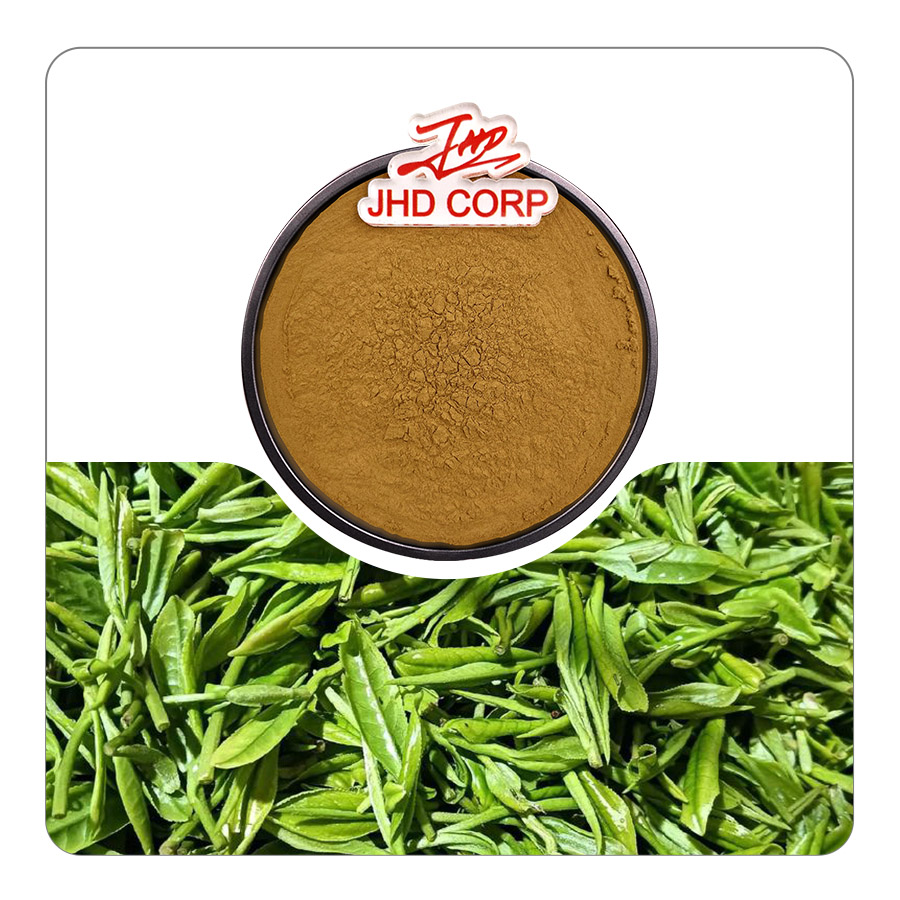Welcome to JHD Nutrasource!
Shop
Green Tea Extract
Green Tea Extract is derived from the leaves of the Camellia sinensis plant, the same plant used to make green tea. Unlike brewed tea, which is consumed as a liquid, green tea extract is a concentrated form that contains higher levels of bioactive compounds. It is typically produced through a process involving hot water or solvent extraction, followed by purification and concentration. The extract is rich in catechins, particularly epigallocatechin gallate (EGCG), which are powerful antioxidants. Green tea extract is available in various forms such as capsules, tablets, powders, and liquids.
Description
| Product Name | Camellia sinensis |
| Appearance | light brown to tan |
| Specification | ≥30%, ≥50%, or ≥70% |
| Test Method | ≥30%, ≥50%, or ≥70% |
| Source | the leaves of the Camellia sinensis |
| Certificate | Organic,Kosher/Halal,GMP,Non-GMO |
Function
- Antioxidant Properties: Green tea extract is renowned for its high content of catechins, especially EGCG. These compounds act as potent antioxidants, neutralizing free radicals and reducing oxidative stress. This helps protect cells from damage and lowers the risk of chronic diseases such as cancer and cardiovascular disease.
- Weight Management: The catechins and caffeine in green tea extract can enhance metabolism and increase fat oxidation. This makes it a popular ingredient in weight loss supplements, as it may help boost energy expenditure and reduce body fat.
- Cardiovascular Health:Green tea extract has been shown to improve various markers of cardiovascular health. It can help lower LDL cholesterol levels, reduce blood pressure, and improve endothelial function, thereby reducing the risk of heart disease.
- Cognitive Function: The combination of caffeine and L-theanine in green tea extract can enhance cognitive function, including improved alertness, focus, and memory. L-theanine also has calming effects, which can reduce anxiety and promote relaxation.
- Antimicrobial Effects: Green tea extract contains compounds that have antimicrobial properties, which can help inhibit the growth of bacteria and viruses. This makes it beneficial for oral health and reducing the risk of infections.
- Anti-inflammatory Effects: The catechins in green tea extract have anti-inflammatory properties, which can help reduce inflammation in the body. This is beneficial for managing chronic inflammatory conditions and reducing the risk of related diseases.
- Skin Health: The antioxidants in green tea extract can protect the skin from UV damage and reduce signs of aging. It can also help improve skin elasticity and hydration, making it a popular ingredient in skincare products.
Application
- Dietary Supplements: Green tea extract is widely used in dietary supplements, often marketed for weight loss, improved metabolism, and overall health. It is available in various forms such as capsules, tablets, and powders. People take these supplements to boost their antioxidant intake, enhance cognitive function, and support cardiovascular health.
- Functional Foods and Beverages: Green tea extract can be incorporated into functional foods and beverages, such as energy bars, smoothies, and fortified drinks. These products aim to provide additional health benefits beyond basic nutrition, such as improved metabolism and reduced inflammation.
- Cosmetics and Skincare: The antioxidant and anti-inflammatory properties of green tea extract make it a valuable ingredient in cosmetics and skincare products. It is used in creams, serums, sunscreens, and other topical products designed to protect the skin from environmental damage and promote overall skin health.
- Pharmaceuticals: In the pharmaceutical industry, green tea extract is being studied for its potential use in treating various conditions, including cancer, cardiovascular disease, and neurodegenerative disorders. Its antioxidant and anti-inflammatory effects make it a promising candidate for supporting overall health and reducing the risk of chronic diseases.
- Traditional Medicine: Green tea has been used for centuries in traditional medicine, particularly in Asia, to treat various ailments. Modern research is now validating many of these traditional uses, leading to increased interest in green tea extract for medicinal purposes.
- Oral Health Products: Due to its antimicrobial properties, green tea extract is used in oral care products such as toothpaste and mouthwash. It can help reduce plaque formation and prevent bad breath.

